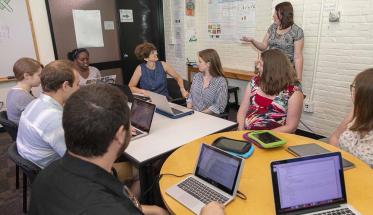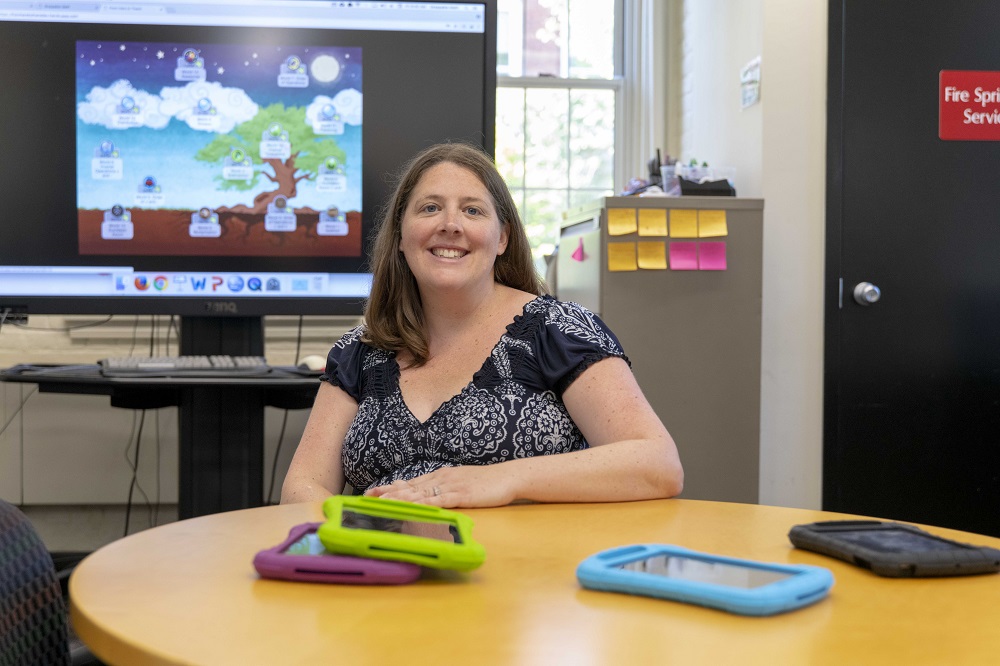Erin Ottmar, assistant professor of psychology and learning sciences, and recent recipient of two grants to study math cognition and problem solving in students, readily admits that what she does for a living is unconventional. And, she likes it that way.
 “I’m definitely an outside-the-box thinker. I also like to challenge my ideas and other people’s ideas,” says Ottmar, whose research aims to unpack the mechanisms of learning and develop and evaluate classroom interventions that improve mathematics teaching and learning. “I don’t know many universities where I could do what I do here. I’m very lucky to be in a program where what I do is valued and I can always innovate.”
“I’m definitely an outside-the-box thinker. I also like to challenge my ideas and other people’s ideas,” says Ottmar, whose research aims to unpack the mechanisms of learning and develop and evaluate classroom interventions that improve mathematics teaching and learning. “I don’t know many universities where I could do what I do here. I’m very lucky to be in a program where what I do is valued and I can always innovate.”
Ottmar’s research is getting a boost from more than $3.4 million in grants from the U.S. Department of Education and the Small Business Innovation Research (SBIR) program to study math cognition and problem solving in students, and to better understand how teachers can use dynamic technology to teach (and learn) algebra. Over the past several years, Ottmar has also co-developed two educational technologies that embed perceptual learning and gesture into the learning of mathematical concepts: From Here to There (FH2T) is a puzzle-based, educational iPad application; Graspable Math is an interactive web-based tool that allows you to manipulate and solve mathematical expressions and equations (see video below).
“I think educational technology not only provides an opportunity to both teach and assess kids’ knowledge but, also, to give them an opportunity to explore and receive feedback,” she says.
When it comes to her own focus on education, she admits she’s intrigued by the process of learning how people learn. “Learning is not content. It’s a process about engaging with people. Problem solving,” she explains. “I’ve always been fascinated by everything to do with learning.” At WPI, she wants to “make people realize that education and learning is scientific unto itself.”
In 2011 she received her PhD in Educational Psychology: Applied Developmental Science from the University of Virginia, where she specialized in social and emotional learning and mathematics education. After graduate school, she spent three years as a postdoctoral research scientist in the Psychology Department at the University of Richmond. It was here that her interests in math cognition, gesture, and technology grew and the development of FH2T and Graspable Math began. Before coming to WPI, she was a visiting research associate in the Department of Psychological and Brain Sciences at Indiana University.
"I think educational technology not only provides an opportunity to both teach and assess kids’ knowledge but, also, to give them an opportunity to explore and receive feedback."
“I think I’ve always been drawn to teaching. I’ve always been drawn to kids,” says Ottmar, who recalled her reputation as “the town babysitter and swim coach” while growing up in nearby Paxton. “Mentoring and coaching is very important to me. I think it’s part of what teaching is. It’s not just in the classroom. Teaching is always.”
Being hired by WPI has brought Ottmar full circle after leaving her small hometown for college without any plans to ever return. Coincidentally, she now lives in Paxton with her husband and soon-to-be three children on land once owned by a distant relative. “If you had told 18-year-old me that I would travel the world, receive my PhD, have a career I love, and raise my family, all right in my backyard, I would have told you that you were completely crazy,” she says. “I’m not really sure how it all happened. It definitely was not planned. But things certainly fell into place.”
-By Lauren Curran

